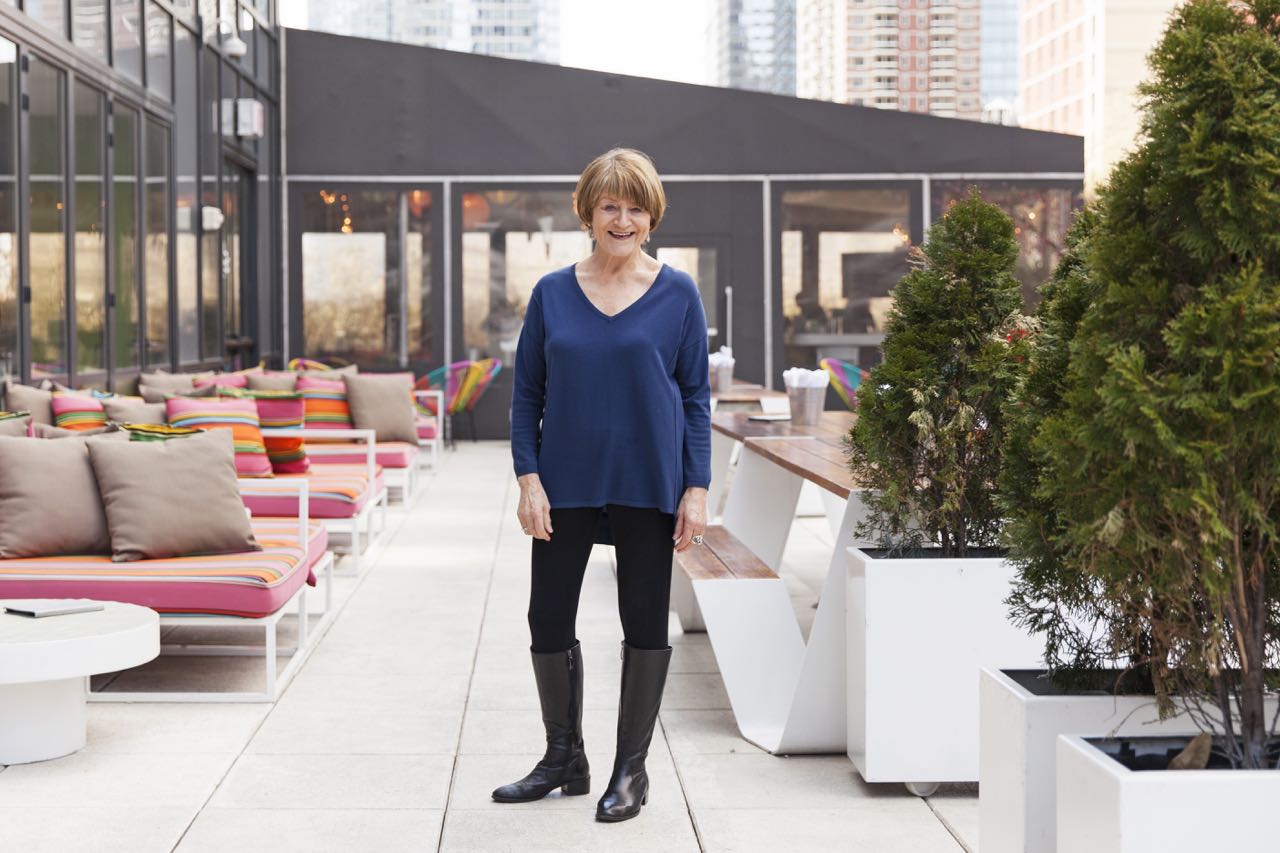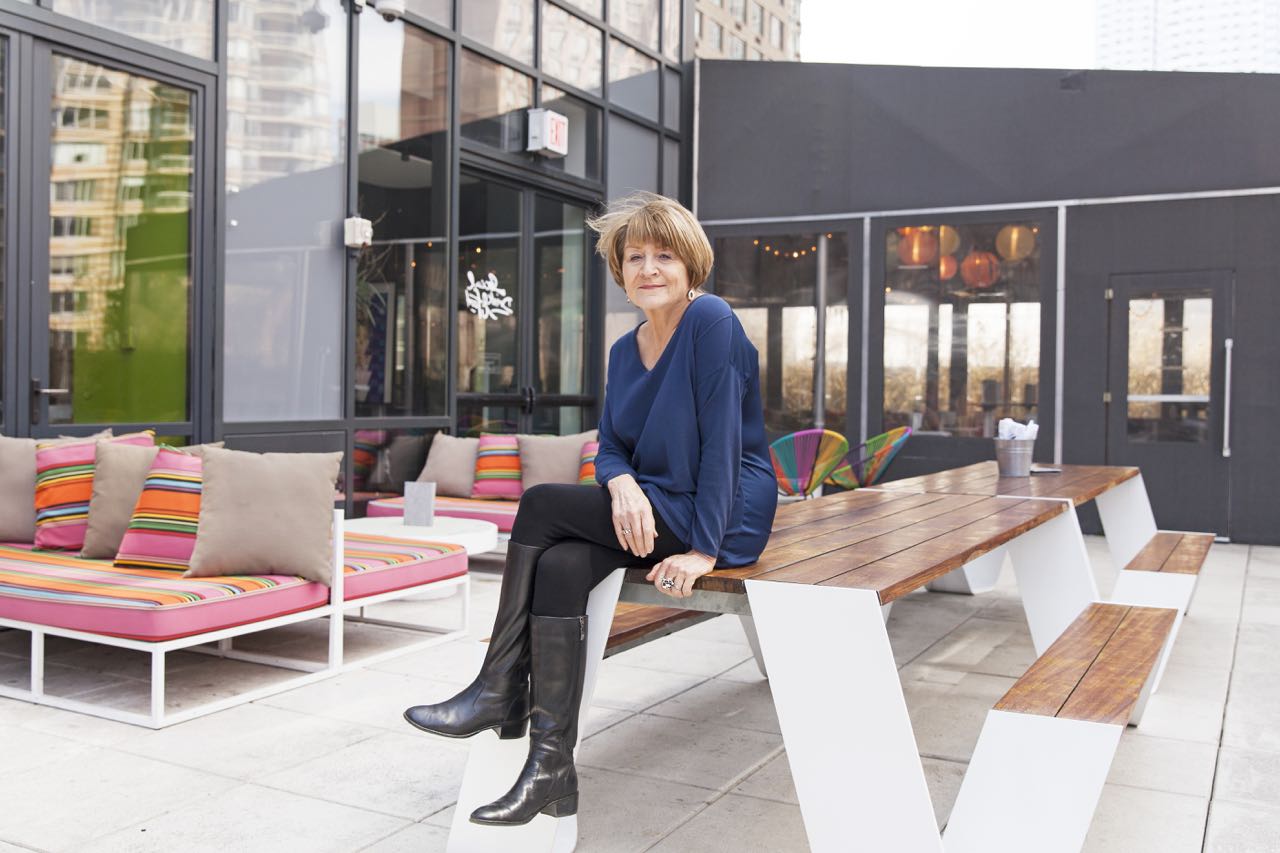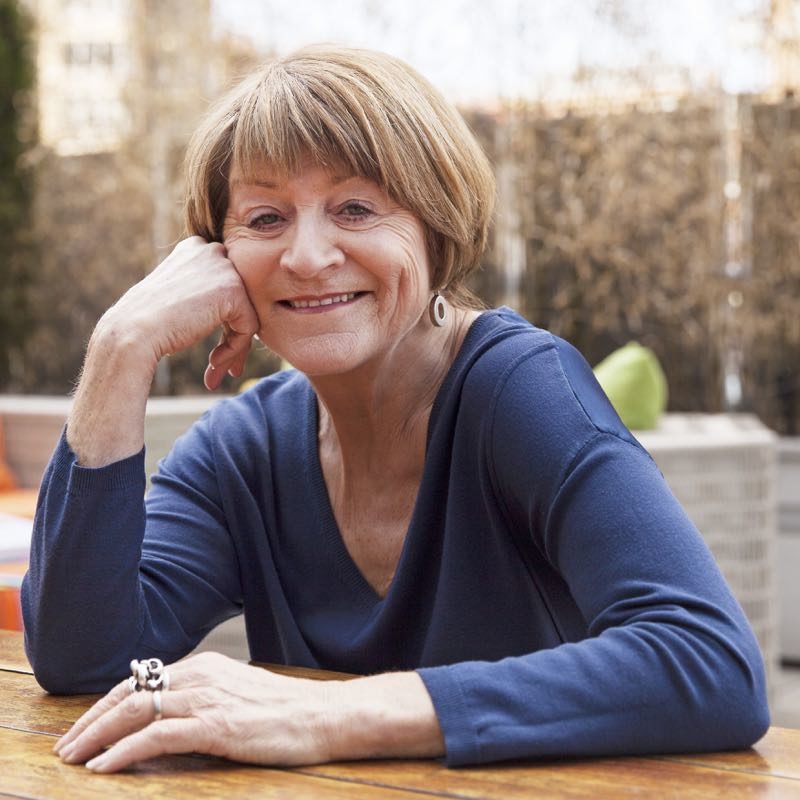Susan Brown on Angels in America

May 24th, 2018
2018 Tony Award nominee Susan Brown is a self-described “chameleon” who plays Ethel Rosenberg, Hannah Pitt, and others in the Broadway revival of Angels in America. She can—and does—transform herself into vastly different roles within a span of seconds. Although Angels marks Susan’s first appearance on The Great White Way, she is a familiar fixture on the British stage, having appeared in productions at prestigious theatres including the National, the RSC, the Royal Court, and the Donmar Warehouse. She is also known to audiences worldwide for her portrayal of Septa Mordane on HBO’s Game of Thrones. I recently spoke with Susan about why Angels is a universal play, her experiences performing it both on Broadway and in London, how she approaches her transformations into her many characters throughout the two plays, and more.
Do you remember when you first encountered Angels? Is this a play that you’ve been aware of for decades, on the other side of the pond?
Yes. I saw the first part of it in London, and I thought it was a wonderful piece of work. I had friends at the time who were dealing with HIV. I had friends then who were dying in London and in America. Some people who were ill then have survived until now, which is wonderful. [Angels in America] had a great effect on me then, so I was very, very aware of it. I’d worked with Marianne [Elliott, the director] twice before. I really, really loved working with her both times. When she asked me to do this [revival], I had two thoughts. I looked at the play and I thought: I can’t do it. The other thought was that surely this play is going to be dated. AIDS isn’t at the forefront of everybody’s consciousness in the same way as it was then, although it’s still terrible, especially in the third world of course. The amazing thing about the play, and the thing I think that has really come through in an even bigger way than it did then, is that it is a universal play, and a state of the nation play. AIDS can always be a metaphor for an awful lot of other things; for being an outsider, for poverty. I think it’s one of the most important American plays of the late 20th century, probably one of the most important plays of the late 20th century, period, and I think it will live on.
Was there a difference in how this revival of Angels was received by London audiences compared to New York audiences? As you said, this is a universal play, but it’s still being presented to two different cultures.
The audiences in London were fantastically appreciative of it. They loved it. The response was fantastic. Coming here with it, to America, to Broadway, I was slightly apprehensive about the fact that it is an essentially British cast. It’s a load of Brits bringing this incredibly important American play to America. The acceptance of the play, and of us, has been just overwhelming. Because I think the really big thing is, it is universal; therefore the fact that there were English people doing it doesn’t really matter. Also, the play has come home. This is its home. I felt that very much, from the very first preview onwards. It felt like it was where it was supposed to be, that it had landed home.
You have a really unusual opportunity here to play, not only a variety of different roles, but also to play different genders.
I was really keen to meet Tony [Kushner] and to say to him, “Why have you done this? Why have you written it in this way?” He is very specific; there are eight main characters. My main character is Hannah, and he very clearly states what parts should be played by the actor playing Hannah, and indeed he does that with the other parts as well. He says which parts they should double with. Everyone except Louis does play more than one part. I asked Tony why, and he just gave me a rather wry smile and said, “You don’t need to ask that question, just enjoy it.” That was the answer that I got. I don’t know why. It wasn’t to do with only having a certain number of actors available in the beginning or anything like that, so I don’t know why. When I read it, I thought, “This is an impossible task. I just can’t see how I can achieve this.” Part of the problem was the speed of the changes. As the show gets on, it gets heavier and heavier for me. In Millennium Approaches, it’s more linear. I play one character at a time and I have time to change between them. In Perestroika, there’s one time when I go, in less than 50 seconds, from Hannah back to the doctor. I looked at this in the script, and I thought, “I just don’t see how this is possible.” The thing about it really—and the reason it was irresistible—was that it was such a unique challenge. It was the most unique challenge I’ve ever been given. Marianne knows my work well, having worked with me twice before, and she’d seen me in other things. The thing that Marianne knew about me, and indeed that I know about myself, is that I am a transformer. I’m a chameleon and I’m a transformer. That is what she needed for this. The uniqueness of the challenge still amazes me. I still can’t quite believe that I’ve managed to achieve it. A lot of people are not even aware of how incredibly fast some of those changes are, which of course is absolutely as it should be, because the aim is to make it look completely seamless and easy. To begin with, I was having more drama offstage than I was having onstage, because it was exhausting. Sometimes I felt like I never had time to prepare for each entrance because everything was so fast and so rushed. It’s not just costume changes of course, it’s wig changes every time. When it gets towards the end of Perestroika, it’s Ethel, Hannah, Ethel, Hannah, Ethel, Hannah, but during the run in London, I learned how to deal with that. It took a while, but now it feels like second nature. Now, I’m pleased to say, the drama is on the stage and not off the stage. This is helped tremendously by the wonderful dressers I’ve had in London, and in New York, here, and wonderful wig people. Without that, it simply couldn’t be done. It’s a team effort, getting people onstage on time is a team effort.
How do you approach the transformation from character to character? Do you find that external elements, like your wigs and costumes, help ground you in each specific character?
Absolutely. Completely. I love doing the Rabbi at the beginning. It’s nice that that character’s the first one and right at the very beginning of the play because there are lots of bits of costume and facial hair. It would be very, very difficult to achieve the Rabbi in a quick change. I don’t have to do that, because he starts the play, which is great. It’s the same actually with the Bolshevik, with Aleksii, at the beginning of Part Two. Because those men start the play, one has time to make sure to get them absolutely right. Between Hannah and Ethel, now, as soon as I get Hannah’s wig on, or Ethel’s wig on, and as soon as that magic Ethel coat, which covers up everything of Hannah underneath—as soon as that goes on, yes, I feel completely in whichever character I’m doing at that time. With Ethel of course, the look was not a problem to achieve because there are iconic pictures of Ethel Rosenberg. If you google Ethel Rosenberg, the first picture that comes up looks exactly like I look in the play, with the little pointy hat and the top coat.

When you’re Ethel, you’re playing an actual historical figure, as opposed to a fictional character. Yet it is Roy’s hallucination of Ethel, a sort of ghost of who she was.
Yes. I mean, for me, she’s real. I just think of her as another one of my characters. I don’t think of her as a ghost or a dead person. She has got some quite funny lines about the fact that she can walk through walls. She’s wonderfully, witfully written, but also, I find Ethel quite moving actually, because she should never have been executed. I found an out of print biography, just of her, because most of the stuff that’s written about the Rosenbergs focuses on [her husband] Julius. This particular book is just about Ethel and it’s called Ethel Rosenberg, Beyond the Myths. I learnt an enormous amount from that book, about what it was like on the Lower East Side of New York during the 1920s and 1930s, and the whole business of communism, which was bordering on respectable before and during the [second world] war, when Russia was on our side. As soon as the Cold War started, the whole idea of communism became so completely taboo. I learnt a lot about that. I learnt a lot about her. She had a terrible and difficult life, and a dreadful relationship with her mother, which is why I think she gets so upset and edgy when Roy starts calling her mother in the scene where he pretends to die.
That scene in which Ethel says the Kaddish over Roy is really poignant and powerful. My understanding is that you actually worked with a coach on how to pronounce the Aramaic?
James [McArdle, who plays Louis] and I worked with a rabbi in London. When we came to America, Tony wasn’t completely happy with the way that we were doing the Kaddish. He just wanted some pronunciations done differently. He wanted some stresses done differently. James and I worked with this absolutely marvelous woman, Franny Silverman. Franny has been really, really marvelous. So, we’ve had fantastic support and help with the Kaddish. I feel very responsible about doing it actually, because somebody said to me, you’re not going to get a more Jewish audience than New York, unless you go to Tel Aviv. One can absolutely tell that, indeed, from the audience, because when James makes his mistakes in the Kaddish, more than half the audience are there appreciating it, and laughing, and knowing that he’s gone wrong. I feel a real responsibility. I have a great respect for it. I’m playing the Rabbi who’s Jewish, Ethel who’s Jewish, Hannah who’s a Mormon. Religious research played quite a big part in the preparation when we were starting in London.
Has the way that you view your own spirituality or religion, been at all influenced by the experiences you’re now having on stage, and the research that you’ve done to prepare for your roles?
I’m not a religious person. I am a spiritual person, but I’m not a religious person. Most of my inner spiritual life has to do with the interest that my husband and I have outside of this business. He’s a casting director, so he’s involved in this business as well. We own a narrow boat, one of those old working boats that were painted in brilliant colors that you see on the canals in England. We have one that we had built for ourselves. We spend an awful lot of time on the River Thames, especially the upper River Thames, which is wonderfully quiet. You feel very one with nature and with the seasons. We spend a lot of time on the canals as well. It’s our Hinterland, away from the rush and bustle of this business. It isn’t religious, but it is a very meaningful and spiritual experience for me, being in the middle of nowhere in the middle of England.
You mentioned that the Thames is like your Hinterland. Your character Hannah has a literal and metaphorical journey from the Hinterlands of Utah to New York City.
She has an amazing journey, Hannah. Somehow, all of the characters in the play seem to fit into two [categories]. Tony’s writing either about people who are prepared to move forward, or people who are stuck, who stay still. The marvelous thing about Hannah is that she does learn to move forward through the meeting with Prior, and through their recognition and grudging respect for one another. She helps Prior to move forward as well. They’re a very, very unlikely couple to make the bond that they make. It’s tremendous for both of them, and moves both of them forward, which is a marvelous thing.
What about moving forward in her relationship with her own son?
Tony has not written a closure or completion scene for Hannah and Joe. It’s interesting. It’s almost as if she can’t make it with Joe, and Joe somehow can’t make it with her. It’s almost as if Prior becomes a surrogate son, almost taking the place of Joe in her life. Her relationship with Joe, I think, is quite open-ended. Maybe they come through, and maybe they don’t.
If we were to put the Bechdel test to this play, Hannah would probably be the most likely character to pass. This is a show that has a lot of emphasis on male friendships and male relationships. So it’s really nice to see Hannah’s exchanges with the homeless woman and with the female real estate agent.
Yes. Yes. Yes. Yes. Of course, I think it’s no coincidence that those parts are played by the actress who plays The Angel [a role shared by Amanda Lawrence and Beth Malone]. She touches with this same person in different forms.
Absolutely. And another role of yours that we haven’t much touched on yet is the doctor.
Oh yes, the doctor.

Has Trump’s presence in the White House informed the way you view the scene with his mentor, Roy Cohn, in the doctor’s office?
I think the fact that Roy Cohn had such a close and strong connection with Donald Trump is extraordinary. The idea that this play should be done again when the fact that Roy Cohn had been so close to Donald Trump is now so meaningful and important to everybody in terms of when they see this play is just extraordinary. Tony couldn’t have known that. How could he ever have known that in the 1980s when he was writing this play? It’s just absolutely serendipitous that this link now exists. This link between Trump and Cohn, it makes the politics of the play even sharper somehow. Nathan Lane has done a huge amount of research. There’s nothing that Nathan Lane doesn’t know about Roy Cohn. All of that stuff is absolutely true about him telling everybody that he had liver cancer when he had AIDS. That is all absolute fact. I mean obviously, one can’t be privy to what went on in his doctor’s office, but the audience is very quiet during that scene. I was very nervous about it because I’m a woman playing a man who is supposedly one of the most expensive doctors in New York City, and I’m a British woman. It made me very, very nervous indeed. This scene is so magnificently well written. Nathan Lane is such a complete joy to be on a stage with and to act with. I know that scene makes us both very nervous. We’re both quite tense before that scene every night. It’s a crucial, important scene, very important. The scene is not about the doctor; the scene is about Roy Cohn, but it’s very important that I should be as convincing as I possibly can be so that people aren’t distracted by the doctor, but are interested in Roy Cohn’s reaction to what that doctor has to say. I was very nervous about that part, and I now absolutely love that scene.
How did you go from being nervous to loving it?
Well, both things can happen together. Both things do happen every night actually, every time we do it.
Out of the five characters that you play, is there one who consistently resonates the most with you, or does it change from night to night?
They all resonate. I’m just one hundred percent committed to all five of them. I’m glad we had such a long rehearsal period in London, and indeed we had a long rehearsal again here. I just feel very blessed and lucky to have been given this extraordinary challenge, really. Yes, I do feel one hundred percent committed to all of those characters. I feel very blessed.

